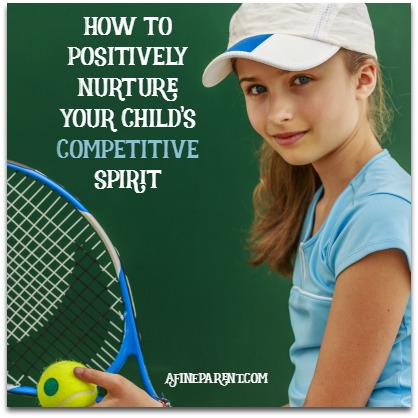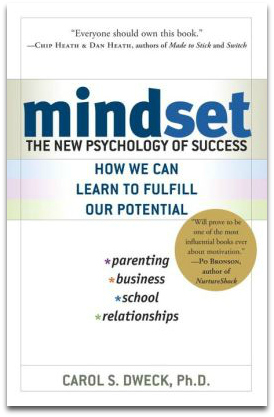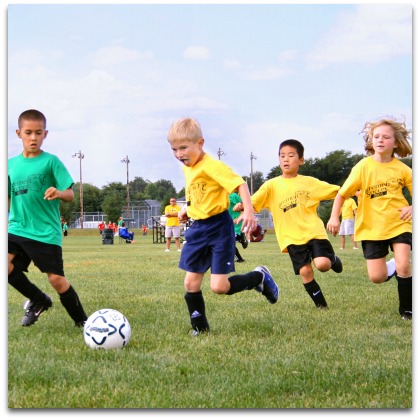 We live in a world where sports and competitiveness are all around us and it often starts at a young age.
We live in a world where sports and competitiveness are all around us and it often starts at a young age.
Think about your family: How much time is spent going to and from practices and games with your kid(s)? How much time do you spend watching or following sports and cheering on your favorite teams?
Though early sport involvement is usually about having fun and developing sport skills, it doesn’t take long for participation to become competitive (and time consuming).
If you head to your local park or sporting field on the weekend, you can likely find little kids (as young as 3 and 4) involved in team sports, with parents on the sideline cheering for their child and his or her team. Parents, coaches and kids cheer when goals are made and points are earned; high fives, hugs and congratulations are given to the winners and with good sportsmanship, hopefully there is respect for the “losers.”
Is all this competition at such an early age good for our kids? The jury is still out on this. And we’re not going to get to the bottom of that argument anytime soon.
In the meantime, though, competition continues to be a prevalent part of the fabric of our everyday lives.
What can we parents do?
For one, we can ensure that our response to it all does not unintentionally encourage a fixed mindset instead of a growth mindset.
What Do We Mean by “Fixed” and “Growth” Mindset?
 Stanford psychologist Carol Dweck has spent the last three decades studying the beliefs that individuals have about themselves and their abilities.
Stanford psychologist Carol Dweck has spent the last three decades studying the beliefs that individuals have about themselves and their abilities.
Dweck’s initial beliefs that led to decades of research were that children either cope or don’t cope with failure. However, her early research showed this isn’t always the case and some children did enjoy failure because it helps them learn. It opened her eyes up to the idea that these beliefs are not set in stone and spurred her quest to learn more about the mindsets we all have.
In her book Mindset: The New Psychology of Success, Dweck says: “For twenty years, my research has shown that the view you adopt for yourself profoundly affects the way you lead your life.”
When we believe that the qualities we have cannot be changed, that they are set in stone, we have a fixed mindset. With this mindset, we are likely to believe that change is impossible and that we are stuck with what we are “given,” (such as intelligence, sporting ability, or creativity).
Dweck has found that those with a fixed mindset feel the need to prove themselves over and over again and evaluating themselves in a very all-or-nothing type of way. “Will I succeed or fail? Will I look smart or dumb? Will I be accepted or rejected?”
Doesn’t that sound exhausting?
The contrast to the fixed mindset is the growth mindset. Those who have this perspective acknowledge that we start out with a set of traits or qualities but that they can change and be cultivated with effort.
With a growth mindset, individuals know that they can “…change and grow through application and experience.” Though this mindset doesn’t mean that we can all be geniuses or extraordinary in some way, it does acknowledge potential.
Individuals with a growth mindset are more likely to approach a situation understanding that even if they don’t do well at the start, they can learn and improve.
Doesn’t this sound more like what we would want for ourselves and our children?
Before we go on to talking about how all of this relates to competitiveness, I want to highlight a classic psychological study that shows it’s not just an individual’s beliefs about themselves, but the beliefs of others that influence growth and change.
In the late 1960s, Robert Rosenthal and Lenore Jacobson hypothesized that the beliefs of school children could be influenced by the beliefs the teachers had about these students.
The teachers in the study were informed that certain students in the class were “intellectual bloomers” meaning that they would do well as the year progressed even if they didn’t show a difference in the beginning. (The reality was that these students were no different than the others and were randomly picked).
What was different is the way in which the teachers spoke to and worked with these children during the year. This likely affected the way the children viewed themselves and their abilities, and they ended up with significantly increased scores compared to the control group in standardized IQ tests. To the teachers, these students had lived up to the expectation. What they didn’t realize is that they created the expectation, and the children rose to meet them.
As parents, there is much we can take from this work. The way in which we talk to our children about their abilities and their qualities, specifically whether we highlight them as fixed or as areas that can be changed with effort, is critical since this impacts the way our kids view themselves.
Competitiveness and Mindset
 Competitiveness by itself may not bad, but we do want to be aware that there is the potential for kids to develop a fixed mindset in a competitive environment. Without appropriate guidance, it is far too easy for your kids to begin to feel that they either have a skill or they don’t, or that they are “good” or “bad” as compared to others.
Competitiveness by itself may not bad, but we do want to be aware that there is the potential for kids to develop a fixed mindset in a competitive environment. Without appropriate guidance, it is far too easy for your kids to begin to feel that they either have a skill or they don’t, or that they are “good” or “bad” as compared to others.
We need to help them develop a growth mindset to not only maximize their potential, but to help them enjoy the competitive aspects of sport and life.
So how can parents help their children to adopt a growth mindset versus a fixed mindset? I am a Sport Psychologist and here are some of the strategies I’ve used with athletes to help them recognize that with effort, they can improve and see change.
#1 Understand that there are different types of goals
Often times a main goal of sport is to win. This is fine, but it means that there is a loser as well. This on its own is not bad, but if these outcome goals are the only goals that kids are focused on, there may be challenges.
No one can control the outcome of a game or a situation. We can only control ourselves: our effort, our frame of mind, our energy, etc.
Encourage your kids to set performance-based goals such as getting to the ball more quickly than last game or giving 100% effort in practice.
Not only are these types of goals in your child’s control, but they also allow the child to see that with focused intention, change can be made. Maybe they still lose the game, but they will see their skill level improve.
This helps to support the growth mindset. You can also highlight after the game that despite the loss, they’re much quicker, sharper or focused in the game and that’s great to see. Remember to give positive feedback to the attainment of performance goals.
#2 Encourage intrinsic motivation
 Just as there are different types of goals, there are different ways we can be motivated.
Just as there are different types of goals, there are different ways we can be motivated.
Individuals are motivated not just by extrinsic factors like winning, trophies, money, or positive feedback, but also by intrinsic factors such as enjoyment and improvement.
You can probably see where I’m going with this. When we, as parents, only motivate with extrinsic factors, we run the risk of further developing the fixed mindset: you either get the trophy or you don’t; if you don’t, you must not have been good enough.
On the other hand, if we help kids develop intrinsic motivation, they are more likely to persevere in hard situations, enjoy themselves more and be less concerned with how others are doing.
We can support intrinsic motivation by asking questions such as “What did you enjoy about today?” or “What did you learn at practice?” These questions take the emphasis off competition and highlight intrinsic factors of motivation.
#3 Highlight traits rather than outcome
This is similar to the first point about goals except we shift the focus now to personality traits. Not just in sport, but in life situations that are competitive, we can only control ourselves and our effort. Hopefully the end result then takes care of itself.
Regardless of the outcome, help your kids see the qualities (as well as the growth in those qualities) such as staying focused, being gritty or managing their time well both on and off the field that helped them be successful.
Two points to keep in mind: again, success isn’t just winning. It could be performing better than they did the previous week or not giving up when they hit a rough patch.
Secondly, we do want to give positive feedback, which is an extrinsic motivator, with the goal in mind that kids internalize this and learn to do this for themselves eventually.
This way, when they are beat by an opponent or don’t get the job they want, they can reflect on their skills and level of effort while realizing that they can make changes for next time.
The 2-Minute Action Plan for Fine Parents
As parents, what we say carries so much weight. While it’s okay to encourage competitiveness, we also want to be aware of the message that we sent.
For our two-minute action, let’s try this. When your kids are successful, what do you normally say?
Remember that when we use language such as “Wow, you are better than that team,” it seems positive, but it also can suggest that not only are they are better today, but they have to always be better, and this can be hard to maintain. This type of feedback helps to support the fixed mindset.
Instead, try something like “Wow, you all worked so hard out there today; no wonder you came out on top!” (The caveat is that if the team had much better skill and didn’t have to try too hard, your child will see right through this, in which case go with something like “Wow, you guys are working hard to keep your skill level up!”).
By helping our kids see their effort, growth, an ability to make change, we support the development of a growth mindset.
The Ongoing Action Plan for Fine Parents
You’ve probably heard the saying “More is caught than is taught,” meaning that our kids pick up so much from our actions and reactions, not just what we try to teach them. For ourselves as parents, we need to try our best to show that we have a growth rather than a fixed mindset.
If you’re helping your child with math, find it hard (or impossible) and say “Ugh! I just don’t get it- I’ve always been terrible at math!” you’re suggesting several things to your child: 1) You aren’t good at this. 2) You’ve always been bad and will continue to be (indirectly conveying that math is a fixed skill as opposed to something that can be practiced and mastered). 3) If you’re bad and can’t change then they may be stuck like this too. Instead, try “Man, this is hard! Let’s see if we can figure this out.”
We want to not only practice what we preach in obvious and direct ways, but in subtler ways as well. Remember that just because you’ve always been poor at time management or struggled with keeping a clean house (that one may be my own example!), you can improve. When your kids see you working hard to make changes in your habits, skills, and ways of thinking, they realize that they can do this too, and you help them learn about the growth-mindset without being obvious.
Aren’t those the best ways to teach lessons anyway?

Thank you for your article, I never heard of fixed and growth mindsets before but it makes absolute sense. I see where I need to change mine and my child fixed mindset to growth mindset.